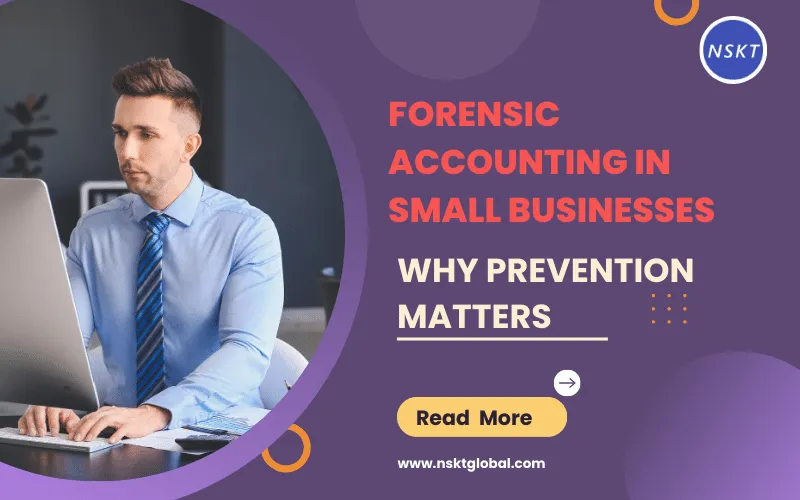Table of Contents
Welcome to our blog post on forensic accounting in small businesses! Whether you are a small business owner, co-founder, or founder, it's crucial to understand the importance of preventing financial fraud and misconduct in your organization. In this post, we will delve into the world of forensic accounting and explain why proactive measures are necessary to protect your business. So, let's get started!
The Impact of Financial Fraud on Small Businesses
Financial fraud can have severe consequences for small businesses. It can lead to significant financial losses, damage the reputation of the business, and even result in legal repercussions. According to the Association of Certified Fraud Examiners (ACFE), small businesses suffer a median loss of $200,000 due to fraud. This amount can be devastating for smaller organizations that often operate on slim profit margins.
Moreover, financial fraud can erode trust among owners, employees, and stakeholders, leading to a toxic work environment and decreased productivity. It's essential for small business owners to recognize the potential risks and take proactive steps to prevent fraud before it occurs.
The Importance of Prevention
Prevention is the key when it comes to combating financial fraud in small businesses. While reactive measures are necessary to address ongoing fraud cases, focusing on prevention can significantly reduce the likelihood of fraud occurring in the first place. Here's why prevention matters:
1. Cost Savings
Preventing financial fraud is much more cost-effective than dealing with the aftermath. The time, effort, and resources required to investigate and resolve fraud cases can be overwhelming for small businesses. By implementing preventive measures, such as internal controls and regular audits, you can save your business from potential financial losses and the associated costs of investigating fraud.
2. Safeguarding Revenues and Assets
Financial fraud can deplete your revenues and jeopardize your business's assets. By taking proactive measures to prevent fraud, you can safeguard your hard-earned revenues and protect your assets from being misappropriated. This protective layer will enhance the financial health and stability of your business in the long run.
3. Maintaining Trust and Reputation
Trust and reputation are vital for the success of any business. By prioritizing prevention, you demonstrate your commitment to maintaining integrity, reliability, and ethical practices within your organization. This, in turn, helps build trust among your employees, customers, suppliers, and other stakeholders, ultimately enhancing your business's reputation.
4. Ensuring Compliance with Regulations
Small businesses often operate under specific regulations and legal frameworks. Proper prevention measures ensure compliance with these regulations and reduce the risk of penalties, fines, and legal consequences. It is essential to stay up to date with any industry-specific requirements and implement appropriate preventive measures to remain compliant.
5. Detecting Organizational Weaknesses
Implementing preventive measures also allows you to identify and address weaknesses in your organization's processes and systems. Through regular audits and internal controls, you can uncover vulnerabilities that may leave your business susceptible to fraudulent activities. By strengthening these weak links, you can create a more resilient and fraud-resistant organization.
Preventive Measures for Small Businesses
Now that we have discussed the significance of prevention let's explore some preventive measures that small businesses can adopt to mitigate the risk of financial fraud:
1. Implement Strong Internal Controls
Strong internal controls are the foundation of fraud prevention. Ensure segregation of duties, wherein no single employee has complete control over financial transactions. Regularly reconcile bank statements, review financial reports, and establish a clear approval process for expenditures. By minimizing opportunities for fraud, you can deter potential perpetrators.
2. Conduct Regular Audits
Regular audits are essential for identifying any irregularities, errors, or fraudulent activities. These can be external audits conducted by a professional audit firm or internal audits performed by trained employees or an outsourced team. Audits provide an independent evaluation of your financial statements, internal controls, and processes, helping you detect any signs of fraud or misconduct.
3. Educate Employees
Educating your employees about the importance of ethical behavior, fraud prevention, and reporting mechanisms is crucial. Conduct training sessions on ethics, fraud awareness, and the consequences of financial misconduct. Encourage your employees to report any suspicious activities anonymously, creating a culture of accountability and integrity within your organization.
4. Use Technology to Your Advantage
Leveraging technology can significantly enhance your ability to prevent financial fraud. Implement robust accounting software that includes features like automated internal controls, audit trails, and access restrictions. Regularly update your software to benefit from the latest security enhancements and patches, reducing the risk of potential breaches.
5. Seek External Expertise
If you lack the knowledge or resources to implement preventive measures effectively, consider seeking external expertise. and consultants specialize in assessing fraud risks, implementing preventive controls, and investigating any suspected misconduct. Engaging such professionals can provide an added layer of protection for your small business.
Conclusion
In conclusion, small businesses must prioritize preventing financial fraud to safeguard their assets, maintain trust, and avoid significant financial losses. By implementing robust preventive measures, such as internal controls, regular audits, employee education, and leveraging technology, you can create a strong foundation for fraud detection and prevention. Remember, a proactive approach is far more effective and cost-efficient than reacting to fraud after it has already occurred. As a small business owner, it's your responsibility to take the necessary steps to protect your business and ensure its long-term success.
If you need further guidance or assistance regarding forensic accounting and fraud prevention, don't hesitate to reach out to our team of experts. NSKT Global is here to help you navigate the complex world of financial fraud and secure your small business's future.







